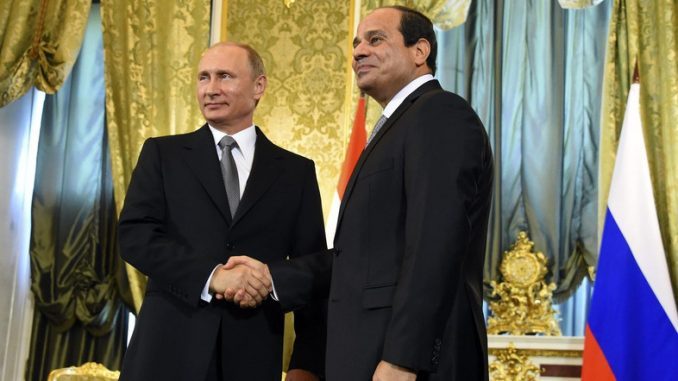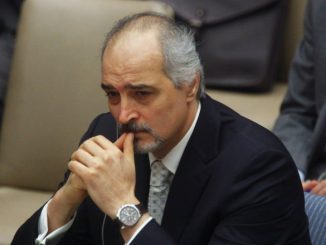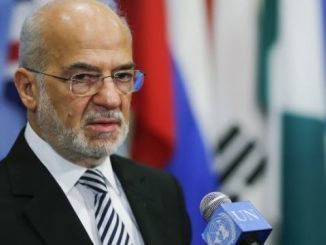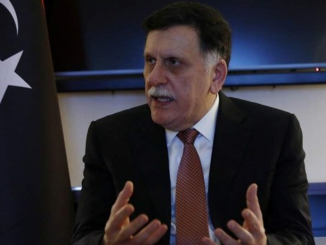
Arab media reported that Egypt and Russia are on the verge of signing a military cooperation agreement that would allow each side to use the other’s airspace and air bases for a period of five years.
If finalized, the agreement would give Russia its deepest presence in Egypt since 1973, when Cairo expelled the military of the Soviet Union and instead became Washington’s closest Arab ally.
Russian media reported that Prime Minister Dmitry Medvedev has endorsed the draft agreement crafted by the defence ministry.
On December 29, 2017, Egypt’s red-carpet welcome for visiting Russian Defense Minister Sergei Shoigu has set in motion a military rapprochement between Cairo and Moscow.
Russian Prime Minister Dmitry Medvedev signed the draft deal with Egypt, inked by Shoigu, which will allow each side to use the other’s military facilities and airspace for a period of five years.
According to Arab media, Russian military forces have already reportedly used Egyptian facilities for operations inside Libya in recent months.
Defense Minister Shoigu applauded the warming relations between both countries during his visit to Cairo.
He said that efforts are being made to step up military and technical cooperation between Egypt and Russia, bolstering the capabilities of Egypt’s armed forces and police, which bear the brunt of the burden in the war against terrorism.
He noted that improving relations between the two sides is coupled with an increasing volume of bilateral contracts for Russian defence enterprises.
The warming of military ties between the two countries comes after a spate of terror attacks in Egypt, including a gruesome massacre of worshipers in a north Sinai mosque last Friday, which left more than 300 people dead. Islamic militants also attacked Egyptian security forces outside Cairo in October, killing and wounding a few dozen.
Egypt’s al-Sisi has accused unspecified countries of being behind recent terror attacks both in the Sinai and outside Cairo.
He said that outside parties are helping the terrorists, supplying them with arms, money, and fighting men, in an effort to seize control of the country and destroy Egypt’s role in the region.
In fact, the news about the recent agreement has been viewed as a “snub” to Washington.
The New York Times considered the Egypt’s preliminary agreement with Russian, “a snub to the Trump administration” as it described it.
During four decades, the United States has provided Egypt more than $70 billion aid at a rate of more than $1.3 billion a year in recent years.
The cost is often justified in part by the argument that it secures the use of Egypt’s airspace and bases for the American military.
Accordingly, “the Egyptian and American analysts called the preliminary deal the latest sign of the waning influence of the United States as President Trump has diminished its military and diplomatic footprint in the region and the world, “reported the New York Times.”
“Power abhors a vacuum and when the United States pulls back we can’t be under the impression that the world is going to stand by and wait for us,”said Matthew Spence, a former deputy assistant secretary of defense for Middle East policy under the Obama administration, which faced similar criticism for its policy toward the region.
He added,”The danger, and the reality is that other countries will take advantage of the opportunity presented when America chooses to pull back.”
“In practical terms, the presence of Russian jets in Egypt would raise concerns about the operational security of American military personnel and require coordinating with American military planes in the same airspace, “said the NYT.
It’s a major problem for the United States-Egypt defence relationship,” said Andrew Miller, a former senior State Department official who is now at the Project on Middle East Democracy.
The NYT said that it was unclear to what extent Washington was informed about the agreement. The Trump administration has not yet replaced the ambassador to Cairo, whose three-year term ended in July.
Edgar Vasquez, a State Department spokesman, said only, “We are aware of these reports and are monitoring the situation.”
News of the preliminary agreement came as the United States of America diplomatic corps has been severely reduced. The American newspaper said that the American foreign policy is facing challenges from all corners.
It said, “In the Middle East, the administration has no assistant secretary of state for Near Eastern affairs or ambassadors to Saudi Arabia, Turkey, Jordan, Egypt or Qatar. And on Thursday, a White House plan surfaced to oust Secretary of State Rex W. Tillerson, who had presided over the mass resignations of senior diplomats while watching his authority undermined by repeated contradiction or belittling from the Oval Office.”
It is worth to mention that Obama administration had been criticized by allies for retreating from the Middle East,” in particular for failing to intervene aggressively enough against the Iranian- and Russian-backed government of Bashar al-Assad of Syria in his civil war against rebels challenging his rule,” said the New York Times.
However, the United States has further reduced its support for Syrian rebels under Trump’s administration, back of its onetime goal of removing Al-Assad from power and take a back seat to Moscow in the Syrian peace process.
President Vladimir V. Putin of Russia has stepped in, expanding Moscow’s influence in the Middle East and seeking to regain influence lost with the collapse of the Soviet Union, the end of the Cold War and the expansion of America’s military presence around the Persian Gulf and elsewhere.
Russia has carried out an aggressive air campaign in Syria that has fortified Assad, cementing his position as a client of Moscow and protecting a Russian naval base on Syria’s Mediterranean coast.
In addition, Russia has sought to make inroads with American allies as well. In September, it agreed to sell $2 billion worth of advanced missiles to Turkey, a NATO member that previously clashed with Russia over its Syria policy.
In October, Russia agreed to sell $3 billion worth of missiles to Saudi Arabia, another close American ally on the other side of the Syrian conflict.
Gamal Abdel Gawad Soltan, a scholar at the Al Ahram Center for Political and Strategic Studies, a state-financed research institute in Cairo said that with Washington seemingly in retreat, “very few if any of the states in the region are willing to rely solely on alliance with the United States and depend on the United States as the insurance policy for their security.”
In contrast, he said, “Russia has proven to be quite effective, and that has been attractive to countries around the region.”
In the early 1950s, Egypt, under the rule of Gamal Abdel Nasser, tried to build counterbalancing alliances with the United States and the Soviet Union. But Washington soon lost patience with Nasser’s nonalignment policy and his anti-colonialist speeches, and Egypt fell more fully into the camp of the Soviets until the 1970s, when President Anwar Sadat switched his allegiance to the West.
Today, Egypt’s al-Sisi, who took power in a military takeover that ousted Egypt’s first democratically elected President Mohamed Morsi in 2013, has been rekindling Cairo’s Cold War alliance with Moscow.
American officials believed he may have been trying to press Washington to keep delivering more aid of its own, a variation of Nasser’s strategy of playing off global rivals.
But American officials have scoffed at the idea that Russia could provide the kind of military support that the Soviet Union once promised, “much less replace the supplies, training and maintenance that the Egyptians have come to depend on from Washington, “reported the NYT.
“Egypt would often hold out Russia as an alternative to American cooperation, and our attitude to some degree was, ‘Good luck with that!” said Mr Spence, the former Defense Department official.
But when the Obama administration temporarily suspended military aid to Egypt in 2013 in response to the government’s mass shootings of more than a thousand of his political opponents, al-Sisi visited Moscow and agreed to buy $3.5 billion in jets, helicopters and missiles from Russia.
Last year, the two countries held joint anti-terrorism drills, with Russian paratroopers conducting training exercises in Egypt with Egyptian paratroopers.
Egypt also signed a preliminary agreement for Russia to build nuclear power facilities in Egypt, although there has been no sign of any construction.
Al- Sisi and Putin have collaborated more concretely to support a shared ally in Libya, Gen. Khalifa Haftar, who is based in eastern Libya across the border from Egypt.
Russia has established a small military presence in a remote part of Egypt’s western desert to back the general, according to American officials briefed on the situation.
In fact, it was not immediately clear what Egypt hoped to receive in return for allowing Russia to use its air bases or airspace. A draft agreement released by Moscow on Thursday gave Egypt only reciprocal rights to use Russian airspace or air bases, suggesting that Russia sought to obtain for free advantages for which the United States has being paying dearly for decades.
Some analysts speculated that Cairo might hope to persuade Moscow to restore tourist flights that it cut off because of security concerns after militants downed a Russian chartered jet leaving the resort of Sharm el-Sheikh two years ago.
Moreover, Egypt may also hope to persuade Russia to move ahead with the preliminary deal to build a nuclear power plant. “There is a long history of Russian preliminary agreements that take forever or never occur,” said Mr Miller, the former State Department official.
Russian state media suggested that the agreement might help Moscow’s military campaign in Syria, another area where Putin and al-Sisi have found common ground.
Egypt’s Persian Gulf patrons, Saudi Arabia and the United Arab Emirates, have viewed the fight against the Assad government as a proxy war against its regional ally, Iran. But al- Sisi has sometimes shown sympathy for Assad as a fellow strongman defending the status quo and fighting political Islam.
Vladimir Fitin, head of the Near and Middle East Center at the Russian Institute for Strategic Studies, said that access to Egyptian airports would allow Russian military aircraft to refuel on their way to Syria, according to a report by RIA Novosti, a state-controlled Russian news service.
On the other hand, some analysts believe that the Egyptian Russian rapprochement won’t affect the Egypt’s relations with Washington.
Hilal Khashan, who teaches political science at the American University of Beirut, said that al-Sisi is eager to receive Russian help in defeating militants in the Sinai, since his own military has not been extremely successful.
“A few months ago, Sisi asked Putin to help him to crush the ISIS uprising in the northern Sinai [based on] the success of the Russian air force in eliminating the radical rebels in Syria, namely ISIS and (Jabhat) al Nusra, and he reiterated his request immediately after the massacre at al Rawdah mosque [in the northern Sinai town of Bir al Abed].”
Khashan said that he does not think Israel will object to the deployment of Russian air power in the Sinai, since Israel appears to have good working relations with Russia in Syria. He also said relations between Egypt and the U.S. will not be seriously affected by the developing relations with Russia.



